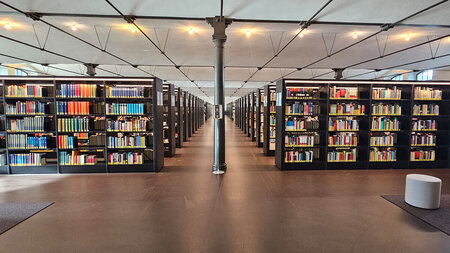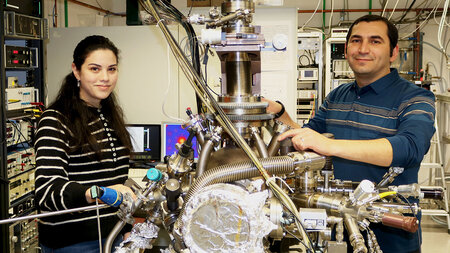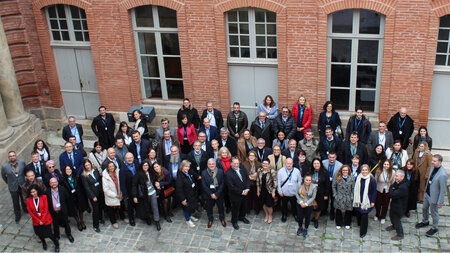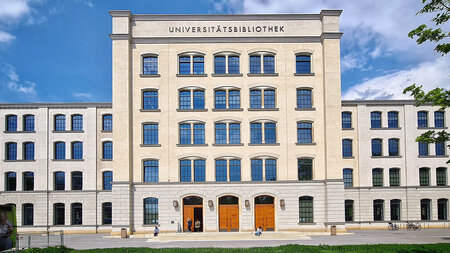“Our Materials Will Make an Impact!”
Eleven questions for Prof. Dr Marc Armbrüster, Professor of Materials for Innovative Energy Concepts since October 2014
-

Prof. Dr. Marc Armbrüster sees numerous points of contact within the Institute of Chemistry related to material synthesis and characterization. Foto: Steve Conrad
Prof. Dr Marc Armbrüster (40) has held the Professorship for Materials for Innovative Energy Concepts since October 2014. In eleven responses he gives “University News“ readers an insight into his professional background, scientific objectives and activities in Chemnitz.
What are actually materials for innovative energy concepts?
The energy turnaround is on everyone’s lips, and now most of us are aware that we need to make our energy supply more sustainable. However, many material related issues need to be solved to make the new energy infrastructure economical, ecological, and socially compatible. We support innovation in this area with our work. One example is the development of materials based on intermetallic compounds to release ultra-clean hydrogen from methanol for fuel cells.
The TU Chemnitz is the right choice for me as a professor, because…
...it provides an excellent environment for our work. No expenses have been spared to provide us with laboratories equipped with the most modern infrastructure. In addition, there are numerous points of contact within the Institute of Chemistry related to material synthesis and characterization. Research groups at the Institute of Physics are specialized in analysis of surfaces, which results in great synergies by means of transdisciplinary collaborations. Synergies are reinforced by the research directions “Lightweight Construction” and “Advanced Powertrains” at the Faculty of Mechanical Engineering. The TU Chemnitz is just the right place to expand our positive experiences with transdisciplinary collaborations.
Can you say a few words about your academic career so far?
Study of chemistry in Munich, Stockholm, and Marburg. Then doctorate in solid state chemistry at the Max Planck Institute for Chemical Physics of Solids and at the Technische Universität Dresden. Postdoctoral work at the Fritz Haber Institute of the Max Planck Society and the University of Cambridge (UK), in order to immerse myself in heterogeneous catalysis. Habilitation at the TU Dresden and appointment as professor at the TU Chemnitz.
Describe your years of study in only a few words.
Exciting, diversified (chemistry, physics, economics), and – with only few exceptions – free of compulsory attendance and school discipline.
Did you have role models during your studies who encouraged you to pursue a scientific career?
The heads of the great expeditions and explorations in the 19th and 20th centuries: Scott, Franklin, Darwin, Humboldt – venture a new beginning in unknown territories, conduct research, collect samples, persevere in difficult conditions and be rewarded with new knowledge and scientific paths!
Do you have any advice for young students and graduates?
Always be curious and honest to yourself!
What would you like to achieve in your teachings in the future?
Not every student will voluntarily exclaim: chemistry is right up my alley! However, I want to increase the number of these students significantly – to convert the lecture "General Chemistry" into an experimental lecture is a first step in this direction.
What impact does your research have at the TU Chemnitz?
The class of intermetallic compounds shows many very interesting physical properties: superconductivity, magnetism, and thermoelectric as well as semiconducting properties. Likewise, they are used as high temperature construction materials for gas and aircraft turbines. Thereby, numerous links arise at the TU Chemnitz. Or in short: our materials will make an impact!
There are around 45,000 professors at German universities. What distinguishes you from all others?
Our unique selling points are the complex combination of intermetallic materials, their chemical properties, and extensive investigation methods under reaction conditions. This allows us to develop and optimize materials for chemical energy conversion, based on knowledge.
What is your favorite place to show guests in Chemnitz?
Downtown, which works out very well – especially at Christmas time!
How do you play a part in the life of the city?
An area which – understandably – was somewhat neglected in my starting period. However, we are all surrounded by chemistry in daily life, so numerous interaction possibilities with the general public may arise.
Further information about the professorship at: https://www.tu-chemnitz.de/chemie/mc/index.php.en
Katharina Thehos
05.02.2016





